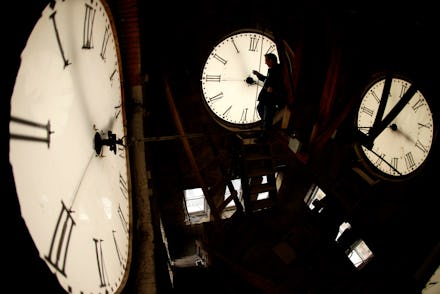Daylight Saving Time Doesn't Just Cost You Sleep — There May Be Hidden Health Hazards Too

People complain about daylight saving time, approaching Sunday at 2 a.m. Eastern, because they lose an hour of sleep. But a recent study found the change in time can also pose serious health risks.
The study, published to the American Academy of Neurology on Feb. 29, found that DST may be associated with a higher risk of an ischemic stroke — a clot blocking blood flow to the brain.
Read more: What Is Daylight Saving Time? The History Behind Why We Set Our Clocks Forward and Back
"Previous studies have shown that disruptions in a person's circadian rhythm, also called an internal body clock, increase the risk of ischemic stroke, so we wanted to find out if daylight saving time was putting people at risk," the study's author, Dr. Jori Ruuskanen of the University of Turku in Turku, Finland, said.
The research found that the rate of ischemic stroke in Finland was 8% higher within the two days following DST — but the rates lowered once those two days passed, suggesting it had something to do with the transition.
Another eyebrow-raising result of the study was that people with cancer were 25% more likely to have a stroke during DST compared to other time periods, and those over 65 years old were 20% more likely to have a stroke.
"Further studies must now be done to better understand the relationship between these transitions and stroke risk and to find out if there are ways to reduce that risk," Ruuskanen said.
"Stroke risk is highest in the morning hours," Ruuskanen told CNN. "Previous studies have also shown that the disruption of the circadian clock due to other reasons (e.g. due to rotating shift work) and sleep fragmentation are associated with an increased risk of stroke."
Ruuskanen stressed that the data show correlation, not causation: "However, we did not know whether stroke risk is affected by DST transitions. What is common in these situations is the disturbed sleep cycle, while the immediate mechanisms for the increased risk are unknown at the moment."
Past studies have shown a correlation between DST and increased health risks as well. A 2014 study at the University of Michigan showed a 24% increase in those admitted to Blue Cross Blue Shield of Michigan Cardiovascular Consortium's database for heart attacks during weeks following DST in the spring, but a 21% decrease in the weeks following fall DST (when we gain back the hour of sleep).
Similarly, a 2012 study at the University of Alabama at Birmingham showed a 10% increase in heart attacks following DST. But, again, the rate decreased by 10% after DST in the fall — so DST hasn't been shown to affect the overall rate of heart attacks.
Correction: March 11, 2016
A previous version of this article misidentified an ischemic stroke as a blood clot in the brain. An ischemic stroke is a clot that blocks the flow of blood to the brain.